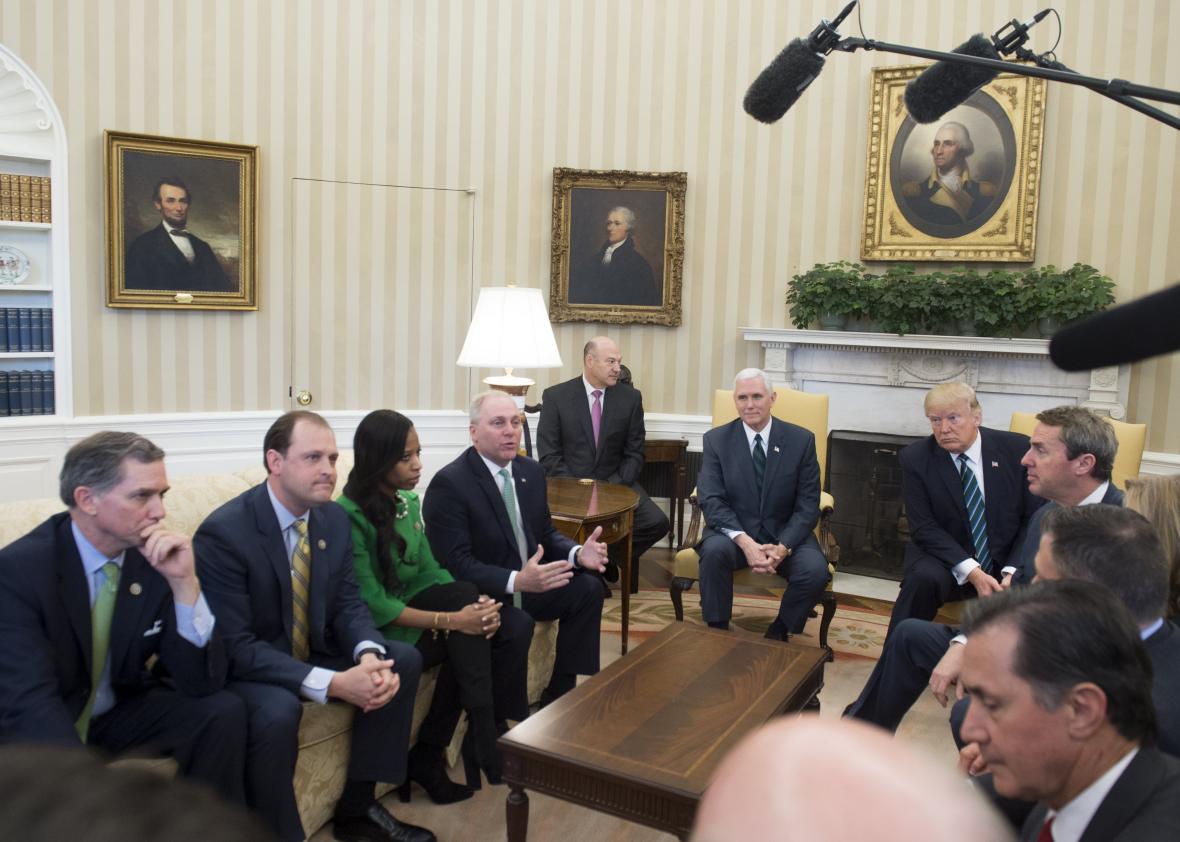Donald Trump made it sound like he had solved the whole problem. “These folks were noes, mostly noes, yesterday,” Trump said from the White House on Friday morning, following a meeting with members of the conservative Republican Study Committee. “And now every single one is a yes.”
One doubts that all of the members of the RSC were so adamantly opposed to the bill before they talked with the administration. One member of the RSC who attended the meeting was Rep. Steve Scalise, the House Majority Whip, whose specific job is to round up votes in support of the legislation. Scalise was probably a yes prior to meeting with Trump.
The big get, though, was Rep. Mark Walker, the RSC chairman who had refused to support the bill prior to Friday. Trump agreed to three changes Walker had been looking for: offering states the option of Medicaid block grants rather than per capita grants, implementing optional “work requirements for Medicaid recipients who are able-bodied and without dependents,” and yet more language asserting that no insurance tax credits can be deployed even in the vicinity of an abortion.
“On balance and with the changes we agreed to in the bill’s final text, I can vote for it,” Walker said in a statement afterward.
The RSC chairman’s endorsement is good news for the House leadership and the White House. But one shouldn’t buy their spin that conservatives are now fully on board with the American Health Care Act. After Walker came around, the smaller and more stringently conservative House Freedom Caucus clarified that they were not on board.
Freedom Caucus chairman Rep. Mark Meadows said that his whip count remains unchanged at 40 noes after the changes, which he dismissed because they were optional for states.
The RSC folding after getting some optional tough-guy changes, along with another clause reasserting that abortion is bad, is a classic example of why the Freedom Caucus was founded in the first place.
The RSC has ballooned over the years to include more than 170 members, a majority of House Republicans. The complaint among far-right conservatives was that it had become too large, and naturally too close to leadership, for it to meet its goal of pushing policy to the right. When the Freedom Caucus was established in early 2015, it was first billed as a “rival” of the RSC that had strayed too far from its role as an agitator. That’s not quite true—the Freedom Caucus didn’t want to grow to nearly to the size of the RSC or overtake it. It wanted to be a bloc just large enough to tank legislation after the RSC gets tweaks, declares victory, and gives in to leadership.
Walker’s endorsement is better viewed as a signal that much of the rank and file are prepared to vote for this bill, something that’s prompted Republican leaders to tentatively schedule a floor vote for next Thursday. But the Freedom Caucus still has not endorsed and is holding out until they see significant changes.
And for all the attention focused on conservative gripes, the changes Trump agreed to move the bill (optionally) rightward are a further problem for the House moderates who are being asked to commit political suicide. With every additional rightward move that the House bill makes, more moderate senators grow weary, the Senate becomes less likely to pass the bill, and fewer House moderates want to walk the plank to vote for something that may well die in the Senate. House leaders are making progress, but the squeeze from conservative and moderate blocs with the numbers to kill the legislation is still alive.
